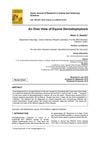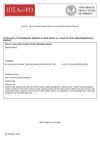65 citations,
August 2016 in “Metabolic brain disease” Children with autism have lower levels of essential and toxic trace elements in their hair.
 4 citations,
July 2017 in “Archivum Immunologiae et Therapiae Experimentalis”
4 citations,
July 2017 in “Archivum Immunologiae et Therapiae Experimentalis” Retinol may affect immune responses in people with frequent skin boils.
 7 citations,
March 2022 in “Scientific reports”
7 citations,
March 2022 in “Scientific reports” Removing anthrax toxin receptor 1 in pigs prevents Senecavirus A infection and causes a rare disease similar to GAPO syndrome.
 4 citations,
November 2021 in “Pharmaceuticals”
4 citations,
November 2021 in “Pharmaceuticals” Paeonia lactiflora and Poria cocos extracts can potentially increase hair growth and reduce hair loss symptoms by lowering testosterone and inflammation levels.
 24 citations,
January 2015 in “Current problems in dermatology”
24 citations,
January 2015 in “Current problems in dermatology” The document concludes that accurate diagnosis of hair loss in children is crucial due to limited treatment options and the condition's psychological impact.
 1 citations,
September 2023 in “Molecules (Basel. Online)”
1 citations,
September 2023 in “Molecules (Basel. Online)” Plant sterols have health benefits like lowering cholesterol, but more research is needed to understand their effects and improve their extraction and sustainability.
 103 citations,
January 2011 in “Blood”
103 citations,
January 2011 in “Blood” Thymus transplantation successfully restored immune function in infants with FOXN1 deficiency.
 April 2023 in “American Journal of Transplantation”
April 2023 in “American Journal of Transplantation” Hormone replacement therapy may lower the risk of severe COVID-19 outcomes in non-immunosuppressed people and male organ transplant recipients.
 1 citations,
September 2022 in “Journal of Medical Case Reports”
1 citations,
September 2022 in “Journal of Medical Case Reports” Rehabilitation therapy helped a severe COVID-19 patient regain muscle mass and return to normal life.
 5 citations,
December 2022 in “Annals Academy of Medicine Singapore”
5 citations,
December 2022 in “Annals Academy of Medicine Singapore” Some skin medications can have harmful interactions with the COVID-19 drug nirmatrelvir-ritonavir, but not with molnupiravir.
 October 2019 in “Asian Journal of Research in Animal and Veterinary Sciences”
October 2019 in “Asian Journal of Research in Animal and Veterinary Sciences” Young horses are more prone to a fungal infection causing hair loss and skin redness.
 19 citations,
December 2021 in “Cureus”
19 citations,
December 2021 in “Cureus” Proxalutamide improved recovery, lowered death rates, and reduced hospital stay for COVID-19 patients.
 40 citations,
December 2016 in “Journal of Dermatological Treatment”
40 citations,
December 2016 in “Journal of Dermatological Treatment” JAK inhibitors show promise for treating skin and hair disorders but need more research on long-term safety and effectiveness.
 60 citations,
September 2015 in “Expert Review of Clinical Immunology”
60 citations,
September 2015 in “Expert Review of Clinical Immunology” Lymphocytes, especially CD8+ T cells, play a key role in causing alopecia areata, and targeting them may lead to new treatments.
 2 citations,
October 2015 in “Human Gene Therapy”
2 citations,
October 2015 in “Human Gene Therapy” The congress highlighted new gene therapy techniques and cell transplantation methods for treating diseases.
 April 2023 in “JMIR Research Protocols”
April 2023 in “JMIR Research Protocols” The study aims to create a model to predict health attributes using diverse health data from Japanese adults.
 November 2021 in “Folia Microbiologica”
November 2021 in “Folia Microbiologica” Trichophyton bullosum has been found causing severe skin infections in donkeys in North Africa for the first time since 1933.
 1 citations,
August 2024 in “Polymers”
1 citations,
August 2024 in “Polymers” Bacterial cellulose is a promising material for biomedical uses but needs improvements in antimicrobial properties and degradation rate.
 17 citations,
January 2021 in “Dermatology and Therapy”
17 citations,
January 2021 in “Dermatology and Therapy” Laser-assisted drug delivery has shown improved treatment outcomes for skin conditions and has potential to reduce side effects and treatment time.
 33 citations,
September 2007 in “Veterinary dermatology”
33 citations,
September 2007 in “Veterinary dermatology” Topical 0.1% tacrolimus significantly improved ear infections in cats.
61 citations,
April 2023 in “Bioactive Materials” Microneedles are effective for painless drug delivery and promoting wound healing and tissue regeneration.
 January 2017 in “Elsevier eBooks”
January 2017 in “Elsevier eBooks” Antioxidants may help improve mitochondrial health and could be used to treat diseases related to cell damage.
 10 citations,
September 2022 in “Psychiatry and Clinical Neurosciences”
10 citations,
September 2022 in “Psychiatry and Clinical Neurosciences” Long COVID affects over half of COVID-19 survivors, causing a range of symptoms like fatigue and neurological issues, with no specific treatment yet.
 2 citations,
September 2016 in “Drug and therapeutics bulletin”
2 citations,
September 2016 in “Drug and therapeutics bulletin” Treating hidradenitis suppurativa needs long-term care and teamwork among doctors, but there's a lack of strong guidance on how to do it.
 33 citations,
April 2020 in “Journal of Clinical Investigation”
33 citations,
April 2020 in “Journal of Clinical Investigation” Stress in hair follicle stem cells causes inflammation in a chronic skin condition through a specific immune response pathway.
 41 citations,
June 2018 in “Medicine Health Care and Philosophy”
41 citations,
June 2018 in “Medicine Health Care and Philosophy” The article suggests using four questions to tell apart necessary medicalization from excessive medicalization, focusing on problem significance, social expectations, medical understanding, and effective resolution.
 March 2000 in “The Journal of pharmacy technology”
March 2000 in “The Journal of pharmacy technology” Finasteride effectively treats mild to moderate hair loss in men aged 18-41, with some side effects.
 11 citations,
December 1921 in “Archives of dermatology and syphilology”
11 citations,
December 1921 in “Archives of dermatology and syphilology” A rare scalp disease causes hair loss, pus-filled nodules, and scarring.
 7 citations,
July 2022 in “Pharmaceutics”
7 citations,
July 2022 in “Pharmaceutics” The microneedle device with rapamycin and epigallocatechin gallate effectively promoted hair regrowth in mice.
 6 citations,
July 2021 in “Microbial biotechnology”
6 citations,
July 2021 in “Microbial biotechnology” The combined treatment with engineered bacteria and yellow LED light improved wound healing in mice.



























